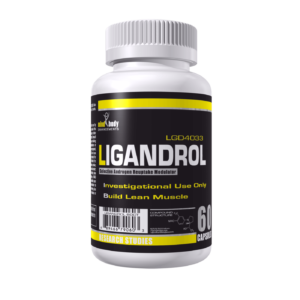
Ligandrol, also known as LGD-4003, is a research chemical currently being developed as a testosterone booster, although results are not proven.
It’s known as a selective androgen receptor modulator, or SARM–this category of compounds is becoming increasingly popular among bodybuilders and athletes for the same reasons: people hope that it can build muscle without some of the drawbacks of actually injecting or using transdermal testosterone.
(If you compete in a sport, use caution, as some athletes have been banned from taking drug)
Benefits
There are some advantages of potential Ligandrol over traditional testosterone. It can be taken orally, which makes dosing much easier, and it binds in a very selective way to androgen receptors, which hopefully means there will be fewer side effects. Testosterone, as you probably know, has a strong muscular strength-building activity, but also a strong affinity for prostate tissue. This can cause it to have a number of negative health consequences. An ideal compound would have the muscular affinity of testosterone, but very little affinity for the prostate; i.e., it would be “selective.”
Another advantage is its long lifetime in the body. The elimination half life of Ligandrol is very long, meaning you would only have to take it one daily, or perhaps even less, to get results.
A pilot study published in 2013 by a team of researchers at Boston University School of Medicine tested the safety and efficacy of Ligandrol in an experiment with 76 men over the course of three weeks (1). The men were split into four groups: one placebo group (to serve as a control) and three groups taking doses of 0.1, 0.3, and 1.0 mg per day in an oral form. The scientists were interested in how the chemical affected lean body mass, and muscle strength, as well as hormone levels. Several blood markers were tracked during the study, as well as for several weeks following the study to examine how coming off Ligandrol affected the volunteers.
Though the study was small, there were no drug-related adverse events detected during the three-week trial. Muscle mass increased significantly, while fat mass remained unchanged. Notably, testosterone levels actually went down in the test subjects. So, if you are looking for a way to boost your testosterone levels, this is not the way to do it. After secession of taking Ligandrol, testosterone levels had returned to baseline within 56 days. The result is dose-dependent, too: the group taking 0.3 mg per day had a sharper drop in testosterone than the 0.1 mg group, and the same was true for the 1.0 mg group.
Side effects
At the doses tested in the pilot study, there were no adverse effects attributable to Ligandrol. Some subjects reported headaches and dry mouth, but these were not associated with the dosage level and did not occur at a statistically significantly higher rate in the experimental groups versus the group taking the placebo.
At the higher doses sometimes used by bodybuilders, the safety of Ligandrol is unknown. Some anecdotes online report massive negative effects, but it’s impossible to tell whether these are ascribable to Ligandrol itself; often these users were also taking other steroids or androgen receptor modulators, and may have gotten the compounds from questionable sources. Still, it’s definitely dangerous to be experimenting with higher than tested doses of a compound that is known to have a strong pharmacological effect on your body.
Recap
It’s very important to emphasize that Ligandrol, which is also sold under the label LGD-4033, is a research chemical. It is not a supplement–it is a highly biologically active synthetic compound that has a known effect on specific biological tissues. If current research continues to be promising, Ligandrol will in all likelihood end up being a prescription drug used to treat conditions like osteoporosis and muscle wasting.
Though it appears to have similar effects on muscle tissue as testosterone, it promises to help you avoid some of the negative side effects of taking exogenous testosterone. Normal testosterone has a strong affinity for muscle tissue, but also the prostate and hair follicles–hence negative side effects like prostate problems and hair loss.
Selective androgen receptor modulators like Ligandrol can help build muscle, and perhaps bone strength too (preclinical trials suggest it helps bone tissue grow stronger), without the negative side effects. However, it is not a testosterone booster! In fact, testosterone levels drop significantly in a dose-dependent manner. The trend based on data in the pilot study suggests that high doses of Ligandrol could drop your testosterone levels pretty much to zero–not a desirable outcome.
For these reasons, Ligandrol is not something to toy around with. If you do decide to experiment with it, it’s best done under medical supervision. You should have your testosterone levels checked regularly to make sure you are not dropping down to harmfully low natural testosterone levels.
All the above aside, Ligandrol does work quite well for its intended purpose: adding lean muscle mass. Even over the course of just three weeks, a dose level of 1 mg of Ligandrol per day resulted in nearly three pounds of additional muscle mass with no change in fat mass.
Does this mean it’s worth it? It’s hard to say. It depends on what your goals are and what your tolerance for risk and uncertainty is. Ligandrol (or any selective androgen receptor modulator) is nothing to mess around with, so definitely take it under medical supervision.
Track your testosterone levels as well as your muscle mass and strength gains. Selective androgen receptor modulators are in the very early stages of development; it’s likely that Ligandrol is neither the most effective nor the safest one that will ultimately be on the market one all the dust has settled.
https://bodynutrition.org/ligandrol/
No comments:
Post a Comment